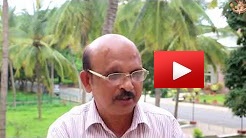
AP 60 to 51
Mr. Sebastian Menachery in conversation with Dr. Joseph J. Palackal.
| Call Number | AP 52 |
| Part Number | Part I - Syro Malabar Church |
| Title | Mr. Sebastian Menachery in conversation with Dr. Joseph J. Palackal. |
| Duration | 45:09 |
| Place of Recording | Recorded at Dharmaram Vidya Kshetram (DVK), Bangalore. |
| Date of Recording | 19 July 2014. |
| Youtube URL | https://www.youtube.com/watch?v=KZqo2wcTmoI |
| Video Segment (s) | AP 52 a to 52s |
Notes
Mr. Sebastian Menachery in conversation with Dr. Joseph J. Palackal.
This interview is valuable, especially to musicologists and Church historians. Although not a professional musician, Sebastian Menachery reminisces, with great enthusiasm, melodies and memories from the Syro Malabar liturgy in the 1950s. Gifted with an unusual musical memory, Menachery sings even texts that only the celebrant (priest/bishop) used to sing, and chants that were heard only once a year. Menachery attributes this to the captivating power of the melodies of those chants. Whether these melodies were composed in Kerala or in the Chaldean churches in West Asia is a topic that remains to be studied. Menachery references the existence of a rich repertoire of Syriac chants that were composed locally in Kerala. He speaks also about the practice of composing and singing more than one melody for a liturgical text (see “Ual ar’a” and “M’haymnīnan”). The texts of some of these chants are Syriac translations of popular Latin chants that the Portuguese missionaries introduced or imposed on the Syro Malabar Catholics. In any event, historians of Kerala’s music can no longer ignore the contributions of Christian composers and church choirs in Kerala in the nineteenth and twentieth centuries. The Christian Musicological Society of India is grateful to Mr. Menachery for showcasing the relevance as well as the immense potential of the Aramaic Project..... Joseph J. Palackal
01. We have failed to hand over the Syriac heritage to the next generation (2:10)
02. In the Quran, Jesus is referred to as “Ruh Allah” (Breath of God) (5:41)
03. “I have learned Syriac and I am proud of it” (6:44)
04. The Syriac music scene at St. Joseph’s Monastery (CMI) at Koonammavu under the leadership of Fr. Justin Menachery and Lonappan Bhagavathar (6:59)
05.Melody of “U al ar’a” (And on earth) from the Syriac translation of the Latin chant, 'Gloria in Excelsis Deo' (7:50)
06: A unique melody of “Kollan Dasne” (from the Syriac translation of the Latin chant, Tantum Ergo by St. Thomas Aquinas), taught by Lonappan Bhagavathar (9:12)
07. Melody of “Barek Maar” (10:32)
08. Melody of “Puqdan Handes” from the knocking ceremony on Palm Sunday (13:08)
09. On the use of the word “Ruh” in the Hindi film lyrics. Ruh should not be translated. (14:34)
10. T. S. Eliot borrowed “Shanti Shanti Shanti” from the Upanishads to conclude “The Wasteland.” (18:08)
11. Melody of “M’haimneenan” (opening words of the Creed) (19:34)
12. Another melody of “M’haimneenan” (Creed) (20:51)
13. Melody of the Commemoration hymn. The fifth strophe/ “Swore am rawrbe” of “Suwha lawa.” (21:25)
14. Melody of the Litany Quryēlaisōn (Kyrie Eleison) in Syriac (22:14)
15. Melody of “Ślām lēk maryam” (Hail Mary). We should preserve the word “Slaamma” (22:53)
16. About the Pesaha meal (Passover meal) on Holy Thursday (24:48)
17. Melody of “Ammaanaa” (My people) from the Good Friday service in Syriac (25:47)
18. Melodies of “U al appai” and “Laaku Maaraa” from solemn Qurbana (26:27)
19. Melody of “Emare d'alaaha” (Lamb of God) from the conclusion of the Litany (28:38)
20. Melody of “Ahai qambel” (Invitation to receive communion). The melody is similar to that of “Puqdan handes” (28:56)
21. Melody of “Rahme Suqaanaa” (from the rite of reconciliation) (29:48)
22. Hymn in honor of the Sacred Heart of Jesus (30:14)
23. Another melody of Quryēlaisōn and Litany (30:33)
24. “Bhooloka paapangale” Malayalam song in honor of the Sacred Heart of Jesus (31:38)
25. Malayalam hymn, “Ethranalleso naadhaa” (32:32)
26. About Fr. Justine Menachery’s role in the publication of the Syriac Malayalam Hymnal (33:07)
27. Melody of a segment from “U al ar’a” (And on earth/from 'Gloria in Excelsis Deo') (36:31)
28. About Fr. Abel Periyappuram and his lyrics (38:22)
29. Melody of “U la tayelan,” the concluding part of the Latin chant, Te Deum (in Syriac translation). (42:34)
Video Segments
- AP 52a - Melody of "U al ar'a" (And on earth). Syriac translation of 'Gloria in Excelsis Deo'.
- AP 52b - A unique melody of "Kollan dasne."
- AP 52c - Sebastian Menachery sings and speaks about the chant, 'Barek Maar" (Bless O Lord) .
- AP 52d - Sebastian Menachery sings and speaks about the chant "Puqdaan hendes" that is sung on Palm Sunday .
- AP 52e - Melody of "M’haymneenan" from the Creed In Syriac during solemn celebration of Qurbana.
- AP 52f - Another melody of "M’haymneenan" from the Creed which was probably composed in Kerala.
- AP 52g - Aramaic Project-52G. Melody of the "Suwha l’awaa" the commemoration hymn in Syriac.
- AP 52h - Quryēlaisōn - Syriac translation of the Latin litany "Kyrie eleison".
- AP 52i - Melody of “Ślām lēk maryam.” which is the Syriac Translation of the Latin chant, 'Salve Regina'.
- AP 52j - Melody of “Ammaanaa” (My people), the lament from Good Friday services.
- AP 52k - Melodies of “U al appay” and “Laaku Maaraa.” Chanting of slotha (prayer) followed by the Resurrection hymn in Syriac.
- AP 52l - Melody of “Emare d'alaaha” (Lamb of God), the Concluding part of the Syriac translation of the Latin Litany.
- AP 52m - Melody of "Ahai Qambel." which is the deacon's invitation to receive the holy communion from the Solemn Qurbana.
- AP 52n - Melody of “Rahme Suqaanaa”, from the reconciliation rite in the solemn Qurbana.
- AP 52o - Reference to a Hymn in honor of the Sacred Heart of Jesus: "Lemba haliya Īśō māran".
- AP 52p - Yet another melody of Quryēlaisōn (Kyrie eleison) and Litany.
- AP 52q - Excerpt from the melody of “U al ar’a” (And on earth). Syriac Translation of 'Gloria in Excelsis Deo'.
- AP 52r - Melody of “Ula tayelan,” from the Syriac translation of Te Deum.
- AP 52s - Sebastian Menachery speaks about Fr. Abel Peiyappuram, CMI.
User Comments
-
Dear Father,
I have watched the latest upload of Mr Sebastian Menacherry. It was wonderful. Thank you for identifying and introducing such a wonderful person to the community. I feel so envious about him. His knowledge and interest in our heritage is so commendable. He even remembers such chants used only once in an year in our Church.The talents and knowlegde of such resource persons should be used well to recapture our lost heritage. Let the Lord shower him all the Graces. Thank you once again Father, you are doing a historical task.
Dr. Martin Thomas Antony,
(MBBS, FRCS, Dip in Lap. Surgery, Dip. in Health Management.)



